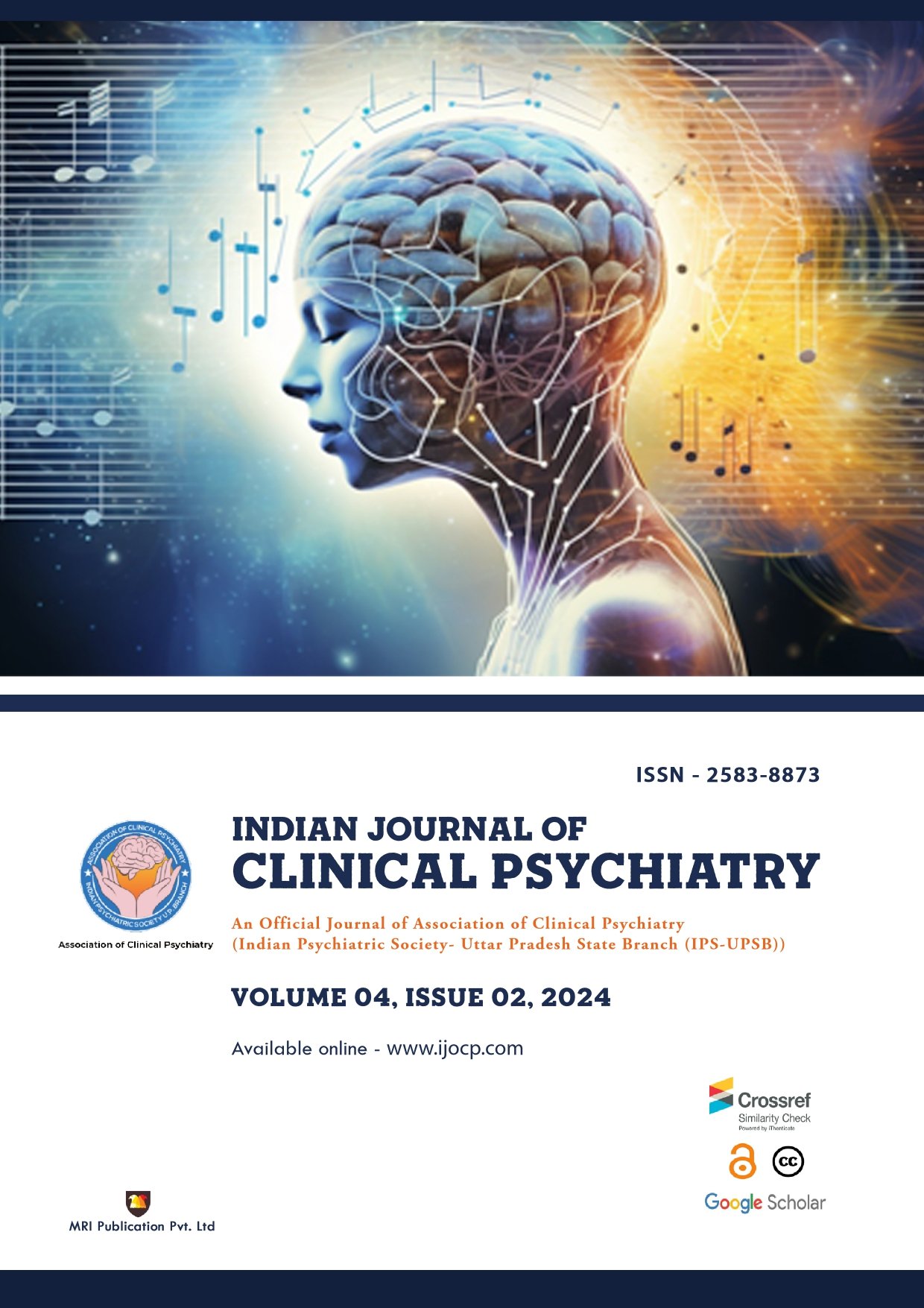Longitudinal Effects of Escitalopram on Quality of Life in Drug-Naive Generalized Anxiety Disorder Patients: A Six-Month Prospective Study
Downloads
Published
DOI:
https://doi.org/10.54169/ijocp.v4i02.144Keywords:
Generalized anxiety disorder, Hamilton anxiety rating scale, WHOQoL-BREF, DSM-5, Quality of life, Interventional study.Dimensions Badge
Issue
Section
License
Copyright (c) 2024 Chetan Choudhary, Rishabh Tripathi, Jishi Joshi Joseph, Kalpesh Gaur, Jitendra Jeenger

This work is licensed under a Creative Commons Attribution-NonCommercial-NoDerivatives 4.0 International License.
Purpose: The objective was to enlist individuals new to treatment for generalized anxiety disorder and assess their self-reported quality of life with the World Health Organization’s Quality of Life brief version Questionnaire (WHOQoL-BREF). The study also aimed to compare the quality of life (QoL) measures pre- and post-treatment.Abstract
Methods: A six-month interventional study monitored 60 participants who had never received treatment for generalized anxiety disorder (GAD) and were diagnosed according to the Diagnostic and Statistical Manual of Mental Disorders, Fifth Edition (DSM-5) criteria at a tertiary private hospital’s outpatient psychiatry department in Udaipur. Using the Hamilton anxiety rating scale, the severity of GAD was measured. Participants were included based on their existing prescription for escitalopram, administered as a 10 mg once-daily dose. Four weeks post-prescription, the WHOQoL-BREF questionnaire was employed to assess any shifts in quality of life.
Results: The study comprised 60 initial-treatment individuals with confirmed GAD diagnoses. The starting average WHOQoL-BREF score was 217.48. After four weeks of treatment with escitalopram, the average quality of life scores rose significantly to 276.48, indicating an average increase of 59 points and evidencing a marked improvement following treatment.
Conclusion: Escitalopram treatment was associated with significant QoL improvement in GAD patients. These outcomes underscore the necessity for effective treatment approaches for this disorder.
How to Cite
Downloads
Similar Articles
- Mohit kumar Shahi mohit, Ashwin J.V, Astha Singh, Dhat Syndrome in Geriatric Population: Cultural Beliefs and Implications , Indian Journal of Clinical Psychiatry: Vol. 3 No. 02 (2023): Indian Journal of Clinical Psychiatry
- Sanjukta Ghosh, Hardik V Patel, Bhaveshkumar M Lakdawala, The Cross-Sectional Study for Comparison of Empathy-based on Competency-based Curriculum among Indian Undergraduates , Indian Journal of Clinical Psychiatry: Vol. 4 No. 01 (2024): Indian Journal of Clinical Psychiatry
- Dhana Ratna Shakya, Sandesh Raj Upadhaya, Cannabis Induced Psychotic Disorder in Cannabis Withdrawal During COVID- 19 Lockdown : A Case Report , Indian Journal of Clinical Psychiatry: Vol. 1 No. 1 (2021): Indian Journal of Clinical Psychiatry
- Tapas Aich, Amil Khan, Prabhat Agrawal, Mixed Affective Disorder: An Update , Indian Journal of Clinical Psychiatry: Vol. 2 No. 01 (2022): Indian Journal of Clinical Psychiatry
- Vivek Agarwal, Teena Bansal, Mental Health Promotion in Children and Adolescents , Indian Journal of Clinical Psychiatry: Vol. 4 No. 01 (2024): Indian Journal of Clinical Psychiatry
- Debanjan Banerjee, T. S. Sathyanarayana Rao, The Slippery Slope of Editing : Balanced Perspectives for Initiating a New Biomedical Journal , Indian Journal of Clinical Psychiatry: Vol. 1 No. 1 (2021): Indian Journal of Clinical Psychiatry
- Pawan Kumar Gupta, Aditya Agarwal, Art and Mental health : Perspectives of The Mind , Indian Journal of Clinical Psychiatry: Vol. 1 No. 1 (2021): Indian Journal of Clinical Psychiatry
- Chittaranjan Andrade, A Potential Role for Statins in the Long-term Reduction in the Risk of Neurodegenerative Disease , Indian Journal of Clinical Psychiatry: Vol. 2 No. 02 (2022): Indian Journal of Clinical Psychiatry
- Shivangini Singh, Dr. Vipul Singh, Post Graduate Psychiatric Education in India - Current Practice and Future Directives , Indian Journal of Clinical Psychiatry: Vol. 2 No. 02 (2022): Indian Journal of Clinical Psychiatry
- Sudha Mishra, G Srinivasan , How vulnerable are they? Women amid the COVID-19 pandemic , Indian Journal of Clinical Psychiatry: Vol. 3 No. 01 (2023): Indian Journal of Clinical Psychiatry
You may also start an advanced similarity search for this article.



